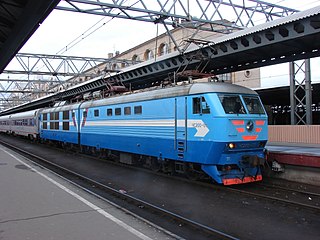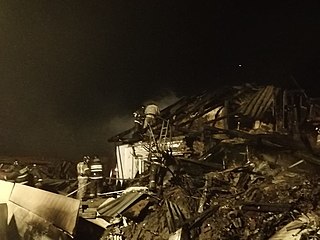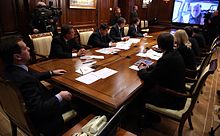
The Saint Petersburg to Moscow railway runs for 649.7 kilometers (403.7 mi) through four oblasts: Leningrad, Novgorod, Tver and Moscow. It is a major traffic artery in the north-west region of Russia, operated by the October Railway subdivision of Russian Railways.
Terrorism in Russia has a long history starting from the time of the Russian Empire. Terrorism, in the modern sense, means violence against civilians to achieve political or ideological objectives by creating extreme fear.
A diverse variety of informal political groups emerged since the presidency of Vladimir Putin starting in 1999. They include remnants of the Yeltsin family, Saint Petersburg lawyers and economists, and security-intelligence elements called the siloviki.

Irena Ponaroshku is a Russian media personality, TV host, journalist, blogger, former VJ on MTV Russia, Evening Urgant TV show presenter, Vogue Russia columnist.

Riyad-us Saliheen was the name of a small "martyr" (shahid) force of suicide attackers. Its original leader (amir) was the Chechen separatist commander Shamil Basayev. In February and March 2003, the group was designated by the United States and subsequently by the United Nations as a terrorist organization. After several years of inactivity, Riyad-us Saliheen was reactivated by the Caucasus Emirate in 2009 under the command of Said Buryatsky; following his death, Aslan Byutukayev became its new leader.

The insurgency in the North Caucasus was a low-level armed conflict between Russia and militants associated with the Caucasus Emirate and, from June 2015, the Islamic State, in the North Caucasus. It followed the official end of the decade-long Second Chechen War on 16 April 2009. It attracted volunteers from the MENA region, Western Europe, and Central Asia. The Russian legislation considers the Second Chechen War and the insurgency described in this article as the same "counter-terrorist operations on the territory of the North Caucasus region".

The Nevsky Express is a Russian Railways express train, formerly the fastest on the prominent route between the Leningradsky Rail Terminal in Moscow and the Moskovsky Rail Terminal in Saint Petersburg. The train has a maximum speed of 200 km/h (125 mph) and does not make any intermediate station stops. It consists of a Škoda Chs200locomotive, 13 passenger cars and a restaurant car. It features 6-person compartments in some cars and airline style seating in other cars.

The 2010 Moscow Metro bombings were suicide bombings carried out by two female Islamic terrorists during the morning rush hour of March 29, 2010, at two stations of the Moscow Metro, with roughly 40 minutes in between. At least 40 people were killed, and over 100 injured.
Said Buryatsky was an Islamist militant leader in the Russian North Caucasus. Buryatsky had been among the most-wanted men in Russia, and he was considered an ideologue leader of the Islamist rebels in Chechnya and southern Russia. He was known in the region as a Russian counterpart of Osama bin Laden. Buryatsky had been identified in YouTube videos, wearing camouflage while preaching radical Islam with an assault rifle.
On 15 July 2014, at around 8:40 am MSK (UTC+04:00), an outbound Moscow Metro train derailed between Park Pobedy and Slavyansky Bulvar stations of the Arbatsko-Pokrovskaya Line. Casualties reported include 24 dead and 160 injured. Early reports suggested a power surge or a terrorist attack to be the cause of the derailment, but both were soon dismissed.

On 3 April 2017, a terrorist attack using an explosive device took place on the Saint Petersburg Metro between Sennaya Ploshchad and Tekhnologichesky Institut stations. Seven people were initially reported to have died, and eight more died later from their injuries, bringing the total to 15.

Alexander Nevsky Square, formerly called Red Square, is a city square in Tsentralny District, Saint Petersburg. It is at the east end of Nevsky Prospekt, linking the street with the Alexander Nevsky Lavra.

The 2021 Menzelinsk parachute Let L-410UVP-E crash occurred near the town of Menzelinsk, Tatarstan, Russia on 10 October 2021.

Pro-democratic and pro-Ukrainian partisan movements have emerged in Belarus and Russia following the Russian invasion of Ukraine, a major escalation of the Russo-Ukrainian War. These resistance movements act against the authoritarian governments of Alexander Lukashenko in Belarus and Vladimir Putin in Russia, as well as against civilian supporters of these authorities and the armed forces of both countries, with the aim of stopping the war.

The crash of the Su-30 occurred at about 17:30 local time on 23 October 2022 in the city of Irkutsk in eastern Russia. The Su-30SM aircraft was performing a test flight when it fell on a wooden two-story residential building in 2nd Sovetsky Lane. Both the pilots were killed. The residents of the house were not hurt as they were not home.

On 2 April 2023, a bombing occurred in the Street Food Bar No.1 café on Universitetskaya Embankment in Saint Petersburg, Russia. Russian military blogger Vladlen Tatarsky, real name Maxim Fomin, died as a result of the explosion and 42 people were injured, 24 of whom were hospitalized, including six in critical conditions.














